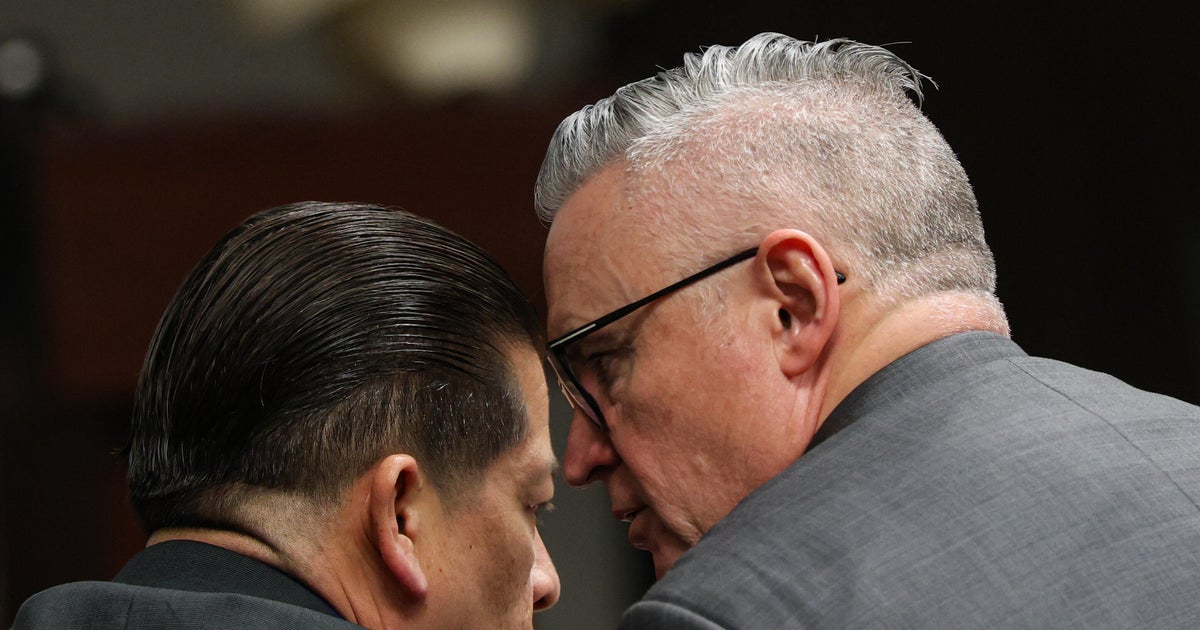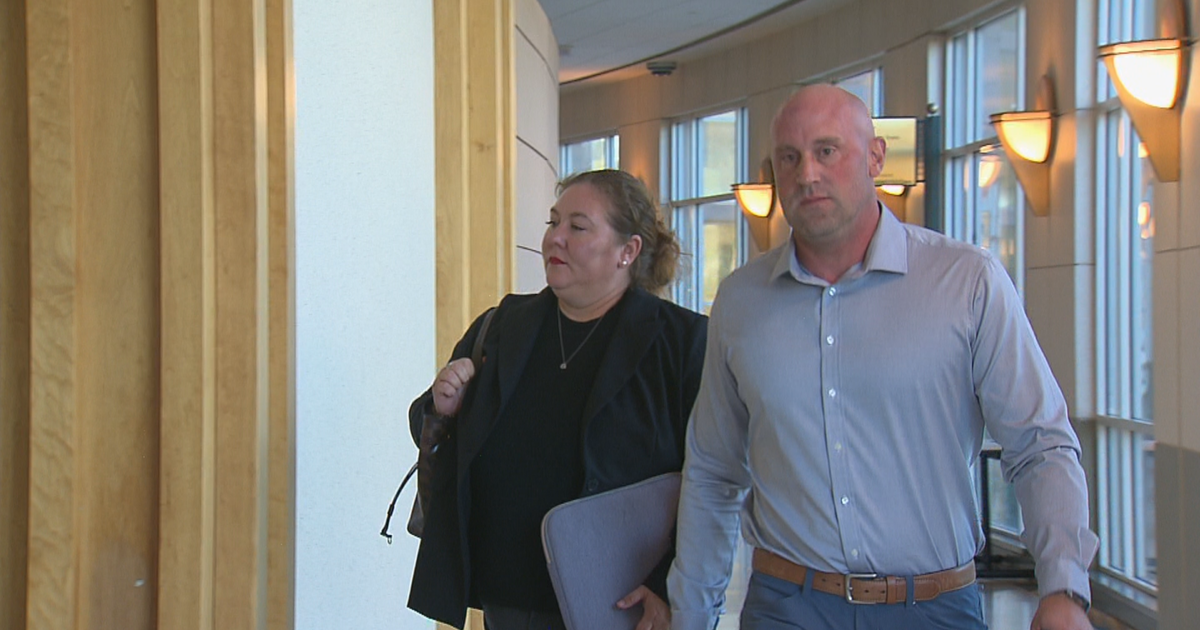Roger Clemens Trial: A Story Of Brian McNamee, Friend Turned Enemy
NEW YORK (WFAN/AP) — Beneath the legalese, the perjury trial of former Yankees star Roger Clemens is a tale of two men: the baseball star and his trainer.
The pair rose together to the heights of their professions only to become bitter enemies who destroyed each other's reputations as stand-up family men who were the best at what they did.
The mutual damage is bound to get worse over the next few weeks as the retired pitcher is tried on charges he lied to Congress when he denied ever using performance-enhancing drugs. Clemens' former trainer, Brian McNamee, says he repeatedly injected his big-name client with steroids and human growth hormone and even saved some of the needles and gauze.
Clemens says McNamee is a liar who fabricated the evidence with designs on blackmailing him. McNamee says Clemens "has led a full-court attack on my credibility."
Since McNamee's allegations were revealed in December 2007 with the publication of an investigative report for Major League Baseball, Clemens' Hall of Fame prospects have been destroyed. His image as a devoted husband and father of four has been tarnished by reports of a list of other women on the road.
McNamee has been accused of worse than infidelity. Clemens' lawyers claim they have evidence their client's chief accuser sexually assaulted an unconscious woman after giving her a date rape drug.
"I trusted him, put my faith in him and brought him around my family and my children," Clemens said in congressional testimony during his last public face-off with McNamee in 2008. Clemens' denials of McNamee's accusations under oath before Congress are what led to the criminal charges he faces at trial in federal court in the District of Columbia.
"McNamee was good at what he did — helping me exercise, diet and stay in shape," Clemens told lawmakers. "We shared an interest in grueling, military-style workouts, but I never asked him nor did he ever give me steroids or human growth hormone. I had no idea that this man would exploit the trust I gave him to try to save his own skin by making up lies that have devastated me and my family."
It's a long fall from their decade-long friendship built in big league clubhouses and weight rooms. They were bound from the time after they first met in 1998, when McNamee got a job as the strength and conditioning coach for the Toronto Blue Jays, Clemens' team at the time.
A lifelong Queens resident and one-time New York City police officer who worked undercover, McNamee had been a baseball catcher at St. John's University. In 1993, McNamee got a job as a bullpen catcher and batting practice pitcher for the New York Yankees. That led to the job with the Blue Jays where he began working with Clemens.
Both men lived in the hotel attached to the team's stadium. McNamee says in that first Toronto summer of 1998, Clemens gave McNamee needles and vials labeled as the steroid Winstrol and asked for his help injecting them. McNamee said he injected Clemens in the buttocks repeatedly over the next several weeks in Clemens' hotel apartment and his performance showed remarkable improvement.
The next year, Clemens was traded to the Yankees and persuaded his new team to hire McNamee as the assistant strength and conditioning coach when his contract with the Blue Jays was up in 2000. McNamee needed to be a member of the team's staff to ride on the team charters, but Clemens personally covered part of his salary and also paid him for personal training during the off-season at home in Houston.
McNamee says after he arrived Clemens made clear he was ready to use steroids again and the trainer suggested he also try human growth hormone. McNamee says during the latter part of the regular season, perhaps as Clemens began to tire, he injected the star pitcher repeatedly with both drugs at Clemens' New York apartment. This time McNamee said he was supplying the drugs.
The next season, 2001, was Clemens best with the Yankees. He finished at 20-3, won his sixth Cy Young Award and reporters looking for his secret wrote about his intense training sessions with McNamee.
"It's hard for any New York pitcher to be out of shape with McNamee's regimen," USA Today reported on July 13, 2001. The article described workouts including long-distance running, sprints, heavy legwork and 600 to 2,000 stomach crunches.
"The visible benefits on Clemens are thick legs that provide the drive to keep his fastball humming at 95 mph, and muscled arms that reduce the wear and tear of throwing a splitter," the article said.
Newsday reported Sept. 10, 2001, that Clemens was lucky to have played for Toronto because it gave him the chance to meet McNamee, his "secret weapon" and "workout guru."
"McNamee is a no-nonsense fellow who immediately hit it off with Clemens, possibly because of their common interest in avoiding small talk and wasting time" to get to work, Newsday said.
McNamee now claims that their "secret weapon" that summer included more steroid injections. But after that season McNamee said Clemens never asked for drugs again.
According to Clemens, 2001 was also the year their friendship began slowly unraveling because of events that he wouldn't discover until much later after their relationship turned sour.
During Yankee road trip to play the Tampa Bay Devil Rays in October 2001, police reports said McNamee was seen having sex with an incoherent woman in a St. Petersburg hotel pool. The woman told police she could not remember what happened. The date rape drug GHB was found in her system.
McNamee was never charged, but he lied to investigators, including denying he worked for the Yankees. His contract was not renewed. McNamee denied he assaulted the woman but instead told police he was trying to pull her out of the pool and rescue her from drowning.
McNamee says around this time he decided he needed to protect himself because "while I liked and admired Roger Clemens, I don't think that I ever really trusted him." He says he took some of the steroid vials, needles and gauze he used to wipe up Clemens' blood, stuffed them inside a Ziploc bag and a Miller Lite can and saved it all in a FedEx box in his basement.
"Maybe my years as a New York City police officer had made me wary, but I just had the sense if this ever blew up and things got messy, Roger would be looking out for No. 1," McNamee said during congressional testimony in February 2008, sitting a few feet from his former friend. "I viewed the syringes as evidence that would prevent me from being the only fall guy."
Clemens' attorneys say McNamee fabricated the evidence after the Florida investigation because he was worried about losing his Yankee job and wanted something to persuade Clemens to keep employing him. But they said Clemens believed his friend's explanation of what happened in the pool and hired him as a personal trainer even though he was no longer allowed in the Yankee clubhouse.
In 2006, a newspaper reported that Clemens and McNamee were part of a criminal investigation into performance-enhancing drugs. Both denied Clemens used steroids, and Clemens told The New York Times, "I'll continue to use Mac to train me. He's one of a kind."
That would change within a year.
Federal investigators discovered McNamee had been buying drugs and pressured him to reveal the ultimate recipients to avoid prosecution. He said he supplied Clemens and other players, including Yankees Andy Pettitte and Chuck Knoblauch, both now retired. Pettitte and Knoblauch have acknowledged they got drugs from McNamee.
McNamee told Congress he didn't want to expose the players but faced perjury charges if he lied. "I have no reason to lie and every reason not to," McNamee said.
"My livelihood is in ruins, and it is painful beyond words to know that my name will be forever linked with scandal in the sport I love," the trainer said.
Your thoughts on Clemens-McNamee? Let us know in the comments below...
(TM and Copyright 2011 CBS Radio Inc. and its relevant subsidiaries. CBS RADIO and EYE Logo TM and Copyright 2011 CBS Broadcasting Inc. Used under license. All Rights Reserved. This material may not be published, broadcast, rewritten, or redistributed. The Associated Press contributed to this report.)







